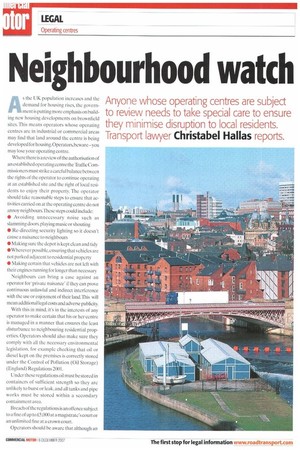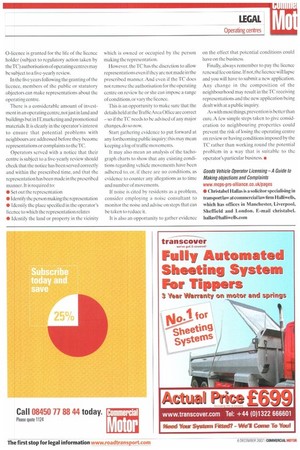Neighbourhood watch
Page 40

Page 41

If you've noticed an error in this article please click here to report it so we can fix it.
Anyone whose operating centres are subject to review needs to take special care to ensure they minimise disruption to local residents.
Transport lamer Christabel Haas reports.
As the UK population increases and the demand for housing rises, the government is putting more emphasis on building new housing developments on brownfield sites. This means operators whose operating centres are in industrial or commercial areas may find that land around the centre is being developed for housing.Operators,beware —you may lose your operating centre.
Where there is a review of the authorisation of an established operating centre the Traffic Commissioner; must strike a careful balance between the rights of the operator to continue operating at an established site and the right of local residents to enjoy their property. The operator should take reasonable steps to ensure that activities carried on at the operating centre do not annoy neighbours.These steps could include: • Avoiding unnecessary noise such as slamming doors, playing music or shouting • Re-directing security lighting so it doesn't cause a nuisance to neighbours • Making sure the depot is kept clean and tidy *Wherever possible.ensuring that vehicles are not parked adjacent to residential property • Making certain that vehicles are not left with their engines running for longer than necessary Neighbours can bring a case against an operator for 'private nuisance' if they can prove continuous unlawful and indirect interference with the use or enjoyment of their land. This will mean additional legal costs and adverse publicity. With this in mind, it's in the interests of any operator to make certain that his or her centre is managed in a manner that ensures the least disturbance to neighbouring residential properties. Operators should also make sure they comply with all the necessary environmental legislation, for example checking that oil or diesel kept on the premises is correctly stored under the Control of Pollution (Oil Storage) (England) Regulations 2001.
Under these regulations oil must be stored in containers of sufficient strength so they are unlikely to burst or leak, and all tanks and pipe works must be stored within a secondary containment area.
Breach of the regulations is an offence subject to a fine of up to £5,000 at a magistrate's court or an unlimited tine at a crown court.
Operators should be aware that although an 0-licence is granted for the life of the licence holder (subject to regulatory action taken by the TC) authorisation of operating centres may be subject to a five-yearly review.
In the five years following the granting of the licence, members of the public or statutory objectors can make representations about the operating centre.
There is a considerable amount of investment in an operating centre,notjust in land and buildings but in IT.marketing and promotional materials. It is clearly in the operator's interest to ensure that potential problems with neighbours are addressed before they become representations or complaints to the TC.
Operators served with a notice that their centre is subject to a five-yearly review should check that the notice has been served correctly and within the prescribed time, and that the representation has been made in the prescribed manner. It is required to: • Set out the representation • Identify the person making the representation • Identify the place specified in the operator's licence to which the representation relates • Identify the land or property in the vicinity which is owned or occupied by the person making the representation.
However, the TC has the discretion to allow representations even if they are not made in the prescribed manner. And even if the TC does not remove the authorisation for the operating centre on review he or she can impose a range of conditions, or vary the licence.
This is an opportunity to make sure that the details held at the Traffic Area Office are correct — so if the TC needs to be advised of any major changes, do so now.
Start gathering evidence to put forward at any forthcoming public inquiry: this may mean keeping a log of traffic movements.
It may also mean an analysis of the tachograph charts to show that any existing conditions regarding vehicle movements have been adhered to, or, if there are no conditions, as evidence to counter any allegations as to time and number of movements.
If noise is cited by residents as a problem, consider employing a noise consultant to monitor the noise and advise on steps that can be taken to reduce it.
It is also an opportunity to gather evidence on the effect that potential conditions could have on the business.
Finally, always remember to pay the licence renewal fee on time. If not,the licence will lapse and you will have to submit a new application. Any change in the composition of the neighbourhood may result in the TC receiving representations and the new application being dealt with at a public inquiry.
As with most things.prevention is better than cure. A few simple steps taken to give consideration to neighbouring properties could prevent the risk of losing the operating centre on review or having conditions imposed by the TC rather than working round the potential problem in a way that is suitable to the operator's particular business..


























































































































































































